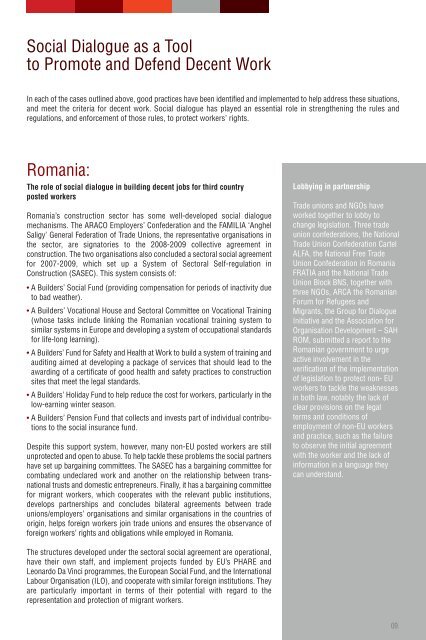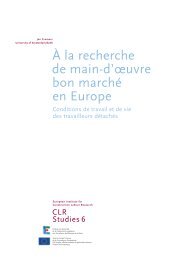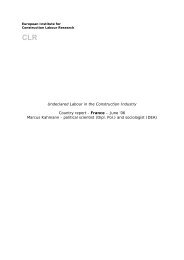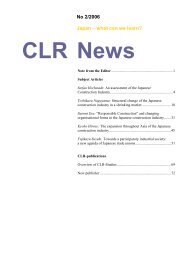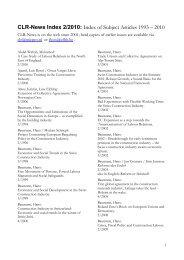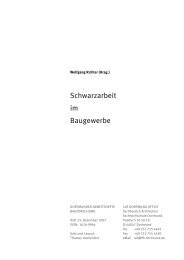SOLIDAR (2010): Social dialogue - Horus.be
SOLIDAR (2010): Social dialogue - Horus.be
SOLIDAR (2010): Social dialogue - Horus.be
You also want an ePaper? Increase the reach of your titles
YUMPU automatically turns print PDFs into web optimized ePapers that Google loves.
<strong>Social</strong> Dialogue as a Toolto Promote and Defend Decent WorkIn each of the cases outlined above, good practices have <strong>be</strong>en identified and implemented to help address these situations,and meet the criteria for decent work. <strong>Social</strong> <strong>dialogue</strong> has played an essential role in strengthening the rules andregulations, and enforcement of those rules, to protect workers’ rights.Romania:The role of social <strong>dialogue</strong> in building decent jobs for third countryposted workersRomania’s construction sector has some well-developed social <strong>dialogue</strong>mechanisms. The ARACO Employers’ Confederation and the FAMILIA ‘AnghelSaligy’ General Federation of Trade Unions, the representative organisations inthe sector, are signatories to the 2008-2009 collective agreement inconstruction. The two organisations also concluded a sectoral social agreementfor 2007-2009, which set up a System of Sectoral Self-regulation inConstruction (SASEC). This system consists of:• A Builders’ <strong>Social</strong> Fund (providing compensation for periods of inactivity dueto bad weather).• A Builders’ Vocational House and Sectoral Committee on Vocational Training(whose tasks include linking the Romanian vocational training system tosimilar systems in Europe and developing a system of occupational standardsfor life-long learning).• A Builders’ Fund for Safety and Health at Work to build a system of training andauditing aimed at developing a package of services that should lead to theawarding of a certificate of good health and safety practices to constructionsites that meet the legal standards.• A Builders’ Holiday Fund to help reduce the cost for workers, particularly in thelow-earning winter season.• A Builders’ Pension Fund that collects and invests part of individual contributionsto the social insurance fund.Despite this support system, however, many non-EU posted workers are stillunprotected and open to abuse. To help tackle these problems the social partnershave set up bargaining committees. The SASEC has a bargaining committee forcombating undeclared work and another on the relationship <strong>be</strong>tween transnationaltrusts and domestic entrepreneurs. Finally, it has a bargaining committeefor migrant workers, which cooperates with the relevant public institutions,develops partnerships and concludes bilateral agreements <strong>be</strong>tween tradeunions/employers’ organisations and similar organisations in the countries oforigin, helps foreign workers join trade unions and ensures the observance offoreign workers’ rights and obligations while employed in Romania.Lobbying in partnershipTrade unions and NGOs haveworked together to lobby tochange legislation. Three tradeunion confederations, the NationalTrade Union Confederation CartelALFA, the National Free TradeUnion Confederation in RomaniaFRATIA and the National TradeUnion Block BNS, together withthree NGOs, ARCA the RomanianForum for Refugees andMigrants, the Group for DialogueInitiative and the Association forOrganisation Development – SAHROM, submitted a report to theRomanian government to urgeactive involvement in theverification of the implementationof legislation to protect non- EUworkers to tackle the weaknessesin both law, notably the lack ofclear provisions on the legalterms and conditions ofemployment of non-EU workersand practice, such as the failureto observe the initial agreementwith the worker and the lack ofinformation in a language theycan understand.The structures developed under the sectoral social agreement are operational,have their own staff, and implement projects funded by EU’s PHARE andLeonardo Da Vinci programmes, the European <strong>Social</strong> Fund, and the InternationalLabour Organisation (ILO), and cooperate with similar foreign institutions. Theyare particularly important in terms of their potential with regard to therepresentation and protection of migrant workers.09.


